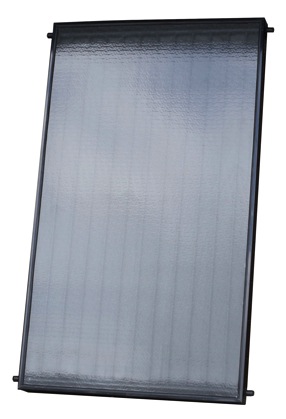Flat Plate Installation Guidelines

SOLKOTE is a premixed, one-part system, shipped ready to use. No thinning or tinting is suggested or recommended. SOLKOTE is heavily pigmented. Agitate thoroughly prior to and as frequently as possible during use to disperse pigmentation and keep the coating in suspension. SOLKOTE must be spray-applied for best results. It is not recommended to apply SOLKOTE by roller or brush, however in some instances dip-coating or electro-static application may be utilized. Contact the factory for help with application methods.
- Step 1 – Design, build and assemble your absorber
- Step 2 – Test absorber surface for cleanliness, “The Vertical Spray Test”
Place absorber plate at a 75-degree vertical angle.
Spray a mist of water onto absorber surface.
If water beads like on a waxed car, surface is not sufficiently clean. Proceed to Step 3.
If water runs down surface, your absorber surface is sufficiently cleaned. Proceed to Step 4. Be sure to handle your cleaned absorber with care! Even finger prints can leave enough grease on a surface to change its emissivity values. - Step 3 – Clean absorber surface
Copper substrates – Soak in mild acid bath (such as phosphoric or citric acid) or in another commercial cleaning bath. Wipe down surface with a strong solvent such as Xylene, Methyl Ethyl Ketone, Toluene or Acetone.
Aluminum substrates – Conversion coat, soak in commercial cleaning bath or wipe down surface with a strong solvent such as Xylene, Methyl Ethyl Ketone, Toluene or Acetone.
Stainless Steel substrates – Passivate surface, soak in commercial cleaning bath or wipe down surface with a strong solvent such as Xylene, Methyl Ethyl Ketone, Toluene or Acetone.
Other substrates – Consult factory for cleaning suggestions
Repeat Step 2. - Step 4 – Apply SOLKOTE HI/SORB-II
Spray apply one, thin coat of SOLKOTE using a standard air atomization, HVLP, or electrostatic spray system (25-35 PSI/1.75-2.5 Bar maximum, consult factory with questions about spray equipment and techniques).
Practice spraying on sample material first, getting comfortable with your sprayer, adjusting pressures and laying down thin coats before moving on to your final absorber surface. Every spray rig and every applicator will be different.SOLKOTE will have a flat, matte, bbq black appearance. To achieve best selectivity on low e substrates, a thinner application is suggested. Coating should be thin enough to still see the sheen of the metallic substrate underneath. SOLKOTE is thickness dependent, meaning the thicker the application, the higher the absorptivity and the higher the emissivity. It relies on a combination of the high absorption characteristics of its pigmentation with the low e characteristics of the substrate to achieve selectivity and semi-selectivity. The more coating is applied, the more pigmentation lands on the substrate and covers the low e surface. Some manufacturers have a preference for higher “a” values and some prefer lower “e” values. Experimenting with different coating thicknesses may help to decide which is best for your design.
A good wet film thickness starting point should be around 1 mil (0.001in/0.0254mm) or less. Use a wet film thickness gauge to measure (Gardco or Riberglass is recommended). Dry film thickness can also be measured with calipers. A good dry film starting point should be 0.5 mils (0.0005in/0.0127mm) or less.
Coverage should be roughly 400sqft/gal (40sqm/gal, 10sqm/L). - Step 5 – To bake or not to bake?
Because of its extremely thin application, SOLKOTE can be easily scratched or rubbed off after application. Be sure to handle coated absorbers with care, especially if they haven’t been fully cured yet, before glazing.
SOLKOTE will normally skin dry within a few minutes of application, however full cure can take several minutes to several hours depending on ambient conditions present or whether you bake your absorber.
If you wish to air cure, let coated absorber sit overnight or as much as 24 hours before glazing. To speed up this process, you may consider exposing your painted absorbers to direct sunlight for several hours, conditions permitting. Proceed to Step 6.
If you wish to use electric, gas or infrared heat lamps, apply heat evenly for at least 15 minutes. Proceed to Step 6.
If you wish to heat cure, bake your coated absorber at 400F (204C) for at least 15 minutes. Proceed to Step 6. - Step 6 – Assemble and seal collector
- Step 7 – Test curing method, “The Out-gassing Test”
To determine whether your curing method is sufficient, assemble and glaze your collector as if it were a final product.
Place collector outside in high-sun for 30 days at stagnation temperatures.
After 30 days, disassemble collector and check the underside of your glazing for any signs of out-gassing. It would appear as a thin, mostly transparent film.
If a film has built up, you will need to bake your absorber or bake it for a greater duration. Revert to Step 5 and consult factory for assistance.
If no film has built up, congratulations! Your curing method is satisfactory and you can proceed with your manufacturing process.
Be sure to apply SOLKOTE in a well-ventilated area. Use solvent resistant gloves, goggles, carbon filter mask and coverall suit when handling or applying the coating. Clean spray gun and lines with a strong solvent such as Xylene, Methyl Ethyl Ketone, Toluene or Acetone. Contact the factory to request MSDS information.
Our technical representatives are available around the clock by phone or email to assist with any surface preparation, application or curing questions and use the form below for pricing inquiries.











